CCA@NAS
CO-CURRICULAR ACTIVITIES
WHY CCA?
Co-curricular Activities (CCAs) are an integral part of our students’ holistic development and a natural platform for students to learn values, develop life skills such as leadership, teamwork, time management as well as 21st Century Competencies to equip them for the future.
CCA is also where our students develop their character and mental resilience. It offers the platform for students to extend their non-academic passion or talent, and possibly discover and develop a life-long interest.
Many NASisans would agree that CCA is where friendships are made, camaraderie is forged, memories are weaved and a sense of belonging and identity are engendered. This is why NASians love their CCAs and pursue them with verve and passion. While as a national policy, participation in CCAs is mandatory for secondary students, NASians attend CCAs because they want to! CCAs add colour to the NASian school experience and are a vital part of our vibrant and dynamic campus life! Come feel the pulse of the CCA experience at NAS!
GOALS OF CCA@NAS
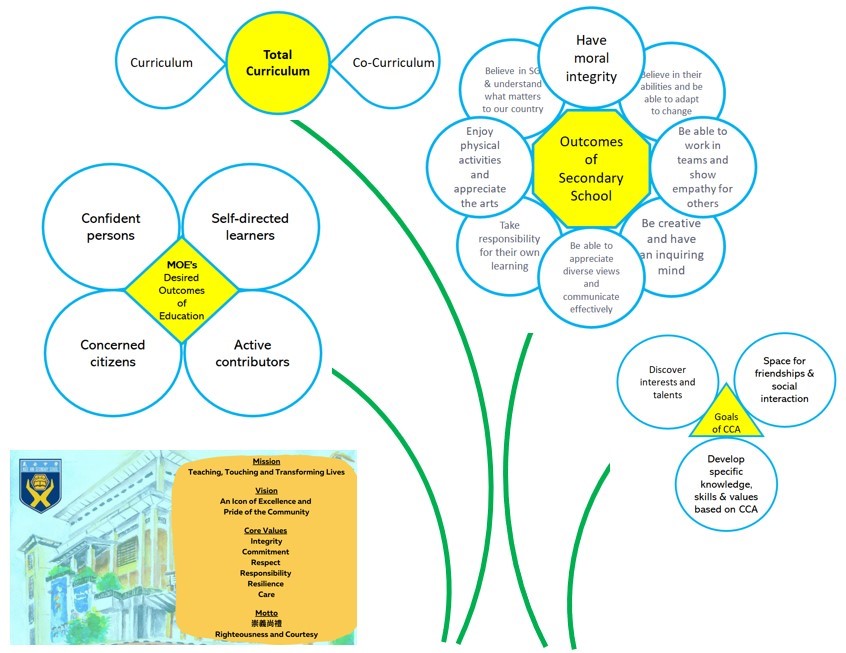
Diagram 1: Our goals of CCA are shaped by (a) our school’s mission, vision and values, (b) MOE’s Desired Outcomes of Education, the (c) outcomes of secondary school education, and (d) MOE’s overarching goals for CCA.
CCAs nurture the whole child.
CCAs are crucial student development experiences that contribute towards the holistic development of our students in the physical, aesthetic, intellectual, moral and social domains.
In short, CCA develops the whole child.
CCAs contribute towards MOE’s Desired Outcomes of Education and Goals for CCAs.
At NAS, CCA is a key platform to develop all NASians towards our desired student outcomes of Future-Ready Learners and Forward-Looking Leaders, in our School of Possibilities and Home to Grow In.
HOW CCAs ARE CARRIED OUT
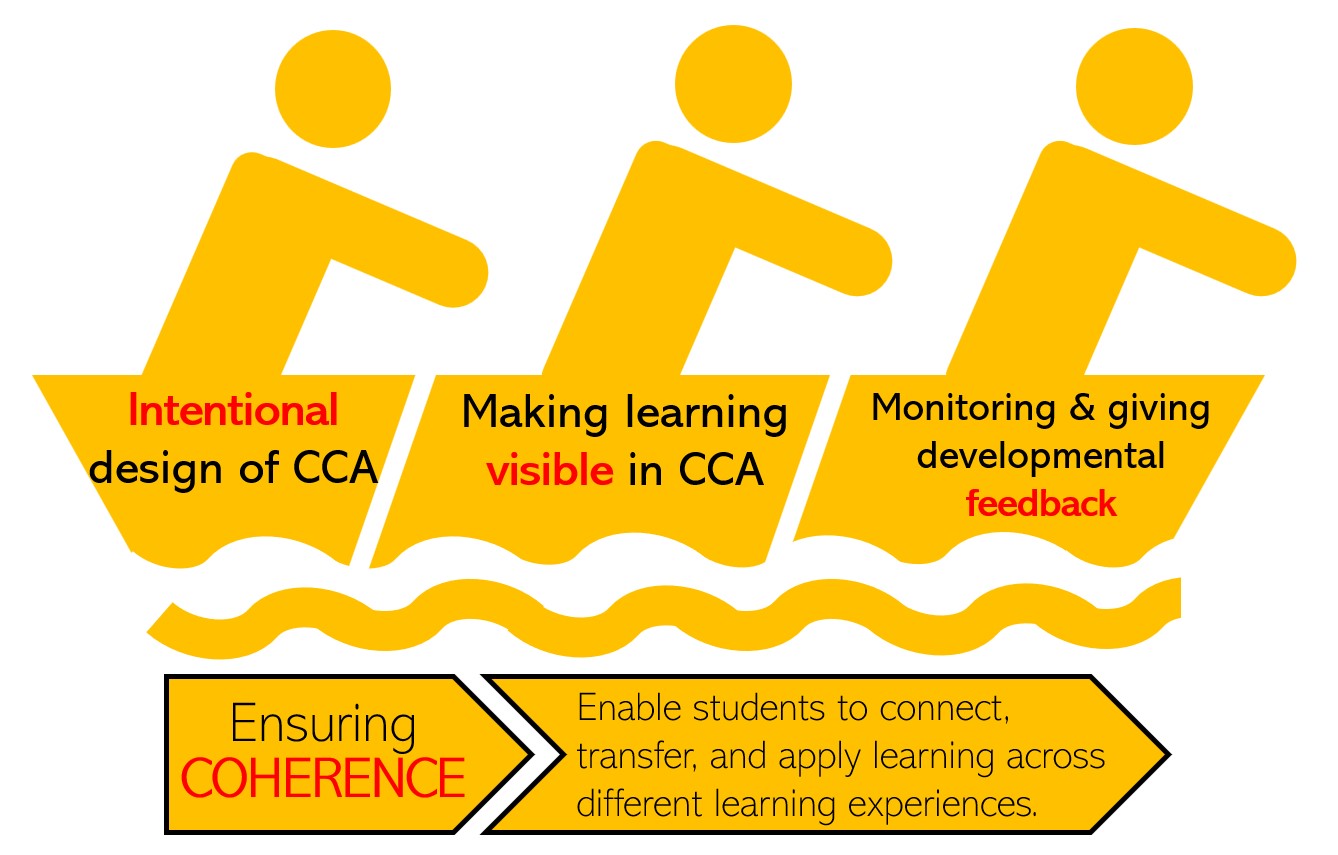
Diagram 2: Delivering our CCA. We strive to align intentional design of CCA with meaningful enactment and guide our students to make the connection between their learning and their lived experiences for authentic learning.
THE DIFFERENT TYPES OF CCA GROUPS AND CCAS IN NAS
We have a total of 18 CCAs under the four categories: Physical Sports, Uniformed Groups, Performing Arts, and Clubs & Societies. The wide array of CCAs on offer serves to meet the diverse interests of our students. Generally, NASians are able to enter a CCA within their top few choices.
We are confident that there will be a CCA you can join, enjoy, learn, grow and enjoy in, even if it was not your first choice of CCA!
While we strive to meet the diverse needs of the students, there is a quota in the number of members each CCA can offer, whether due to physical or pedagogical constraints. This is to ensure that the quality of learning and safety of our students are not compromised.
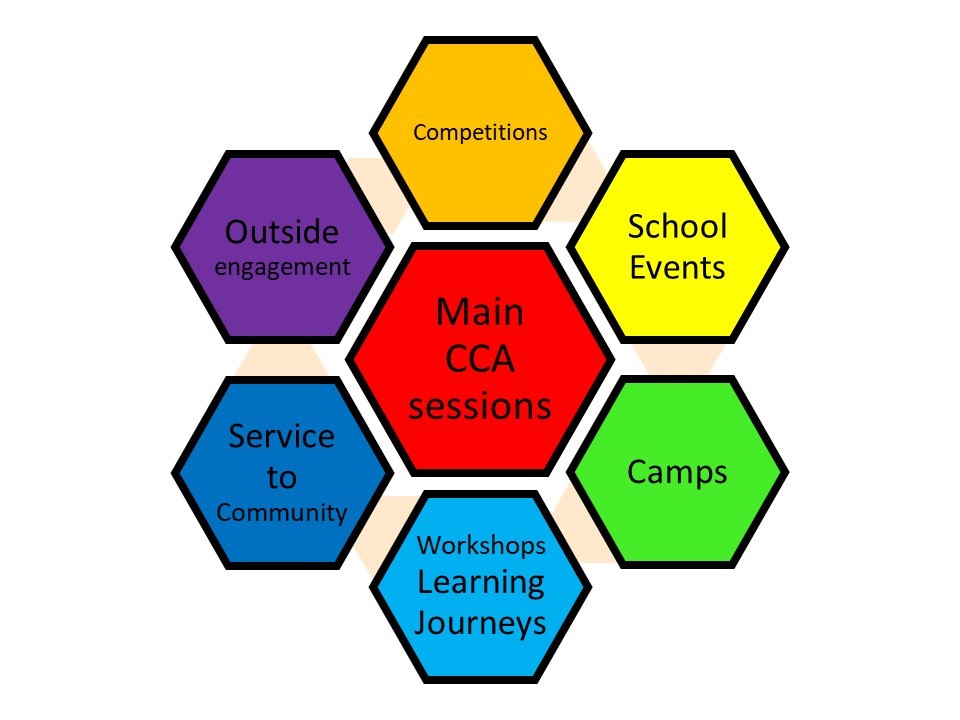
Diagram 3: The activities that make up a CCA.
Each CCA is unique. Each CCA offers its unique blend of activities and learning that make up the full experience and benefits to students of belonging to the CCA. Other than the main CCA experiential sessions, CCAs may have (a) competitions for students to apply what they learnt in the real world, (b) participation opportunities to contribute to school events, (c) the chance to participate in and to lead camping experiences, (d) workshops and learning journeys to widen their learning experiences, € collaboration with external organisations to provide service contributions, and (f) engagements with external stakeholders to widen their exposure.
PHYSICAL SPORTS
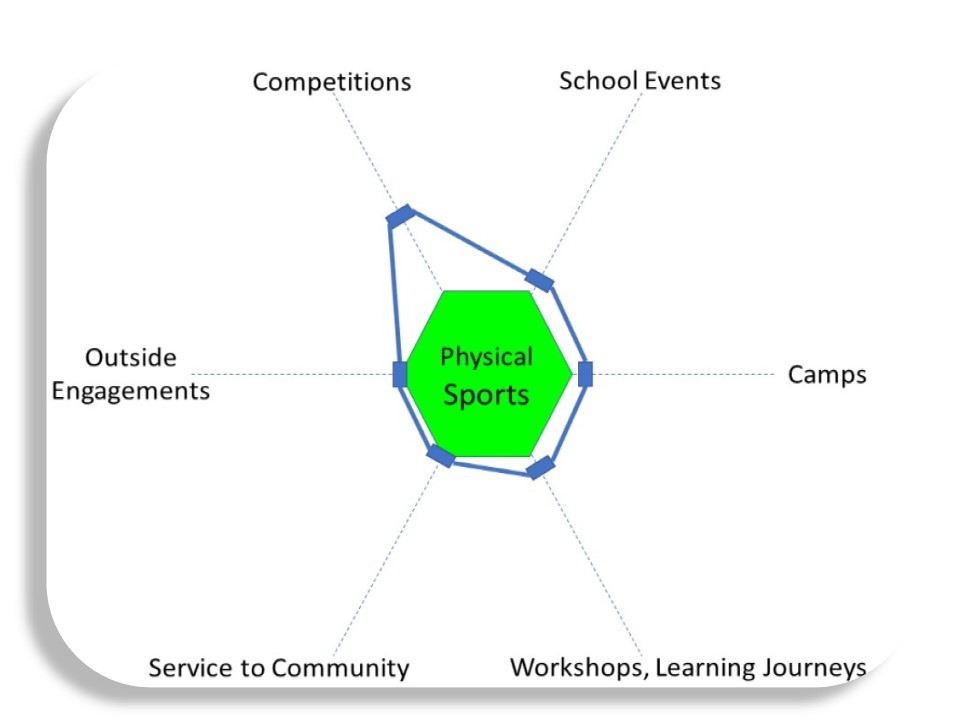
In physical sports CCA, students develop a love for an active and healthy lifestyle through their sport, develop physical and mental robustness and learn about sportsmanship.
Uniformed Groups
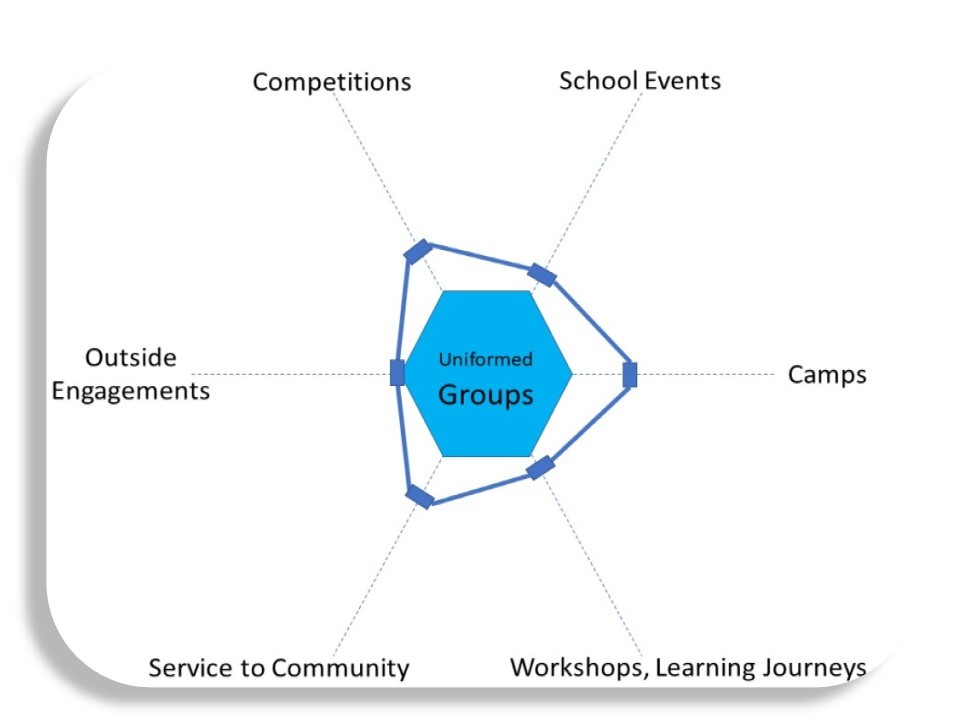
In uniformed groups CCA, we aim to make good citizens of students by inculcating in them self-reliance, resilience, discipline and a spirit of service to others. Specifically, we want them
(1) To be leaders of character: Leadership development courses impart to students the basics of leading others. They are regularly given opportunities to take on leadership roles, such as organising camps and events, and purposefully designing activities to help their juniors grow as individuals.
(2) To be community carers: To create a strong culture of mentorship, wherein senior members exercise care and concern for their juniors and nurture them to succeed the leadership of the unit. Through these practices, our students become youth leaders of outstanding moral fibre.
(3) To put others before self: Students are also encouraged to look beyond oneself and to develop a spirit of compassion and care for others. They often take the initiative and use their knowledge and skills for the betterment of the wider community. They engage in advocacy work that moves others to action, and their exemplary conduct makes them role models for their peers and juniors.
PERFORMING ARTS
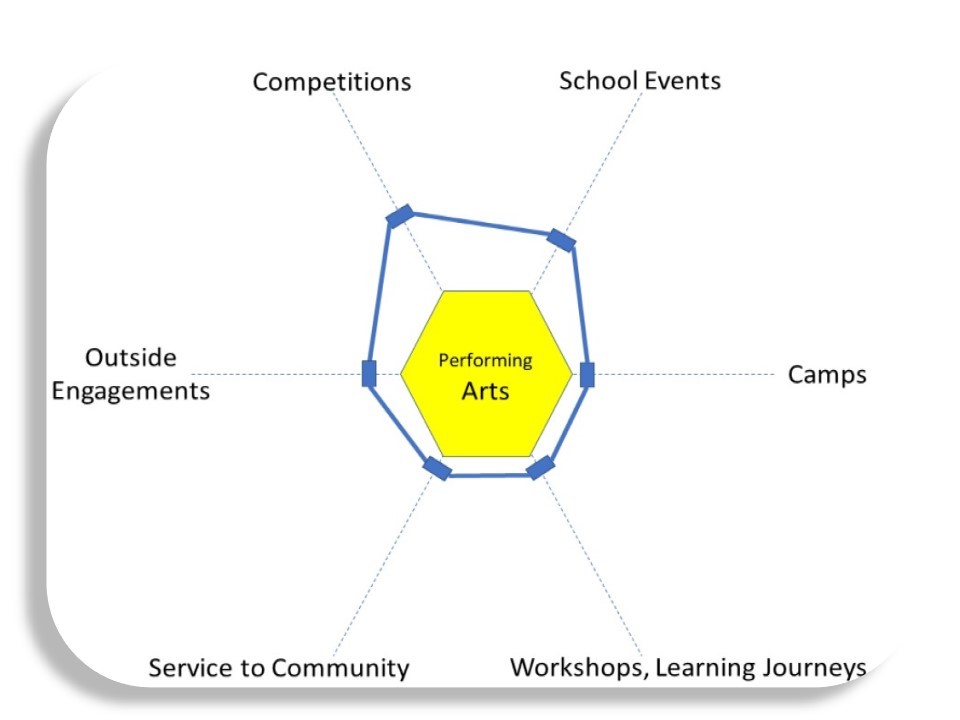
The performing arts CCA nurture in students a sense of graciousness and an appreciation for the rich culture and heritage of our multi-racial society. Specifically, through the CCA, students
(1) Develop a lively curiosity and an inquisitive mind. This is essential as it promotes inventive thinking and an innovative orientation in what they do.
(2) Strengthen their sense of aesthetics, which is the basis of how they perceive the world at large and all that is around them. Such a perspective helps them make meaning of their lives, culture and identity.
(3) Instil resilience and forge develop character, as the continuum of authentic experiences allow them to develop, reflect on, and apply the values, competencies and skills that will help them thrive in the future.
CLUBS AND SOCIETIES
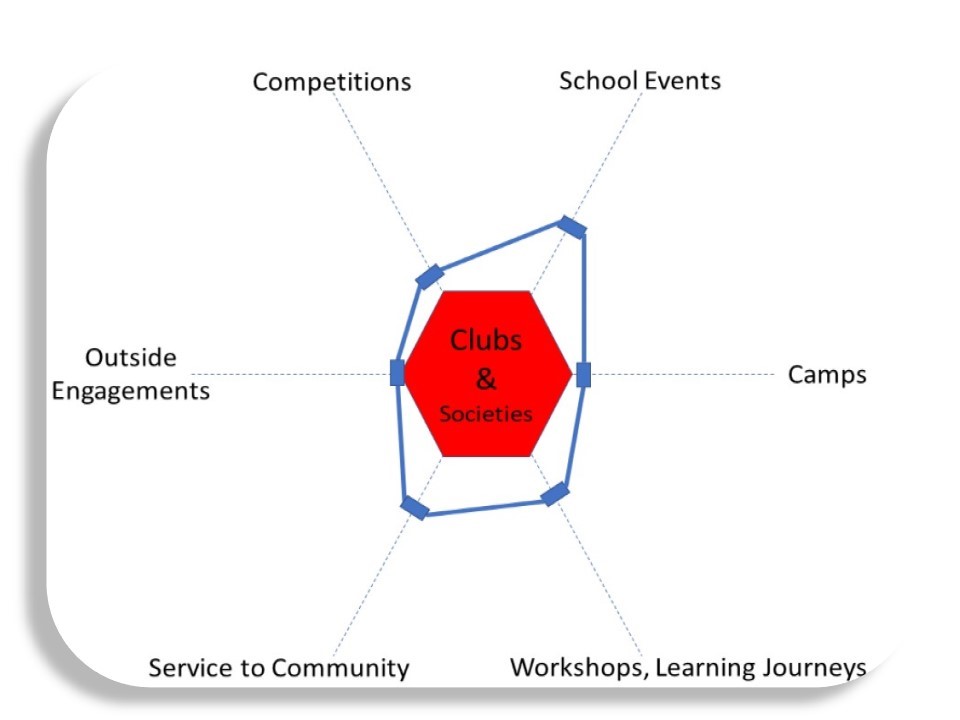
In clubs and societies CCA, students explore and extend their interests in wide-ranging and specialised areas which may be knowledge-based or skills-based. Specifically, students
(1) Discover their interests: Expose students to wide-ranging activities so as to discover their strengths and what excites.
(2) Develop a passion for their interests: Enthuse the students to champion for their interests.
(3) Deliver positive impact on their community: Transfer the skills and knowledge accrued to impactful contributions to the community.

